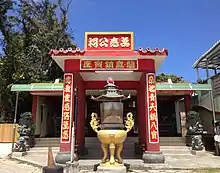Princess Babao Temple
Wanyinggong Temple (Chinese: 萬應公祠; pinyin: Wànyìnggōng Xì), commonly referred to as Princess Babao Temple (Chinese: 八寶公主廟; pinyin: Bābǎo Gōngzhǔ Miào), is a yin miao (temple to deceased people) in Hengchun Township, Pingtung County, Taiwan. The temple is known for its worship an allegedly Dutch princess known as "Princess Babao".
| Princess Babao Temple | |
|---|---|
八寶公主廟 | |
 | |
| Religion | |
| Affiliation | Taoism |
| Deity | Wanyinggong, Princess Babao, Tudigong |
| Location | |
| Location | Hengchun, Pingtung County |
| Country | Taiwan |
 Shown within Taiwan | |
| Geographic coordinates | 21.9425°N 120.7988°E |
| Direction of façade | West |
Princess Babao
According to legend, a Dutch ship wrecked off the coast of Hengchun, and all the men were killed by a tribe of indigenous people living in nearby Guizijiao (龜仔角, now Sheding 社頂). The indigenous people typically did not kill women, but afterwards, a woman named Margaret was killed by a lone tribesman, who either did so deliberately or mistook her gender. The tribesman took eight items off of Margaret: a pair of klompen, a silk scarf, a pearl necklace, a ring with gemstones, a leather suitcase, earrings, a feather pen, and paper; these eight items were later known as babao (literally "eight treasures").[1][2]
Historians have noted the similarities of the Princess Babao legend with that of Mercy G. Hunt, who was the wife of the captain of the USS Rover Joseph Hunt. The Rover shipwrecked in Taiwan in 1867, and its crew, including Mercy, were killed by indigenous people.[1]
History
In 1931, a local resident found some human remains on the beach, which they placed in an urn and put it into the local yin miao. Over the next three years, the region was plagued with misfortune, so residents hired a tongji, who said that the remains belong to a White woman whose spirit is wandering around causing trouble, and a third of the temple's space should be allotted to her for her spirit to settle down.[1][2]
In 1961, the temple was rebuilt, and a smaller separate temple was given to the White woman's spirit. When the temple was completed, another tongji from Sheding claimed that the White woman was Princess Babao from local legends, and the remains were worshipped as such ever since. In 1981, the temple was rebuilt again, and this time Princess Babao was given one of the side altars within the temple. A wooden piece from a shipwreck was placed next to the temple as well.[1][2]
In July 2008, an elderly woman from Sheding got lost. When she was found, she said that a female spirit abducted her. A tongji said that the spirit was Princess Babao, who intends on taking ten lives. In September, the community held a seven-day ritual to try to appease Princess Babao.[3][4]
On March 28, 2016, the wood was set on fire. The police inferred that the fire was due to incense stuck into the wood's cracks during worship, and the temple decided to continue displaying the charred wood in its original spot.[5]
Architecture
Princess Babao Temple is located next to a beach in Kenting National Park. The small temple is divided into three halls: Wanyinggong (unnamed deceased souls) has an altar in the middle, while Princess Babao and Tudigong has an altar on each side. A portrait of a White woman hangs above Princess Babao's altar, and worshipers typically present coffee and red wine to Princess Babao.[2]
See also
References
- 石文誠. 荷蘭公主上了岸?一段傳說、歷史與記憶的交錯歷程 (in Chinese (Taiwan)). Retrieved November 12, 2021.
- 蔡宗憲 (February 19, 2015). "《墾丁八寶公主廟》荷蘭公主 故事永流傳". Liberty Times (in Chinese (Taiwan)). Retrieved November 12, 2021.
- 凌安屏; 賴雅芬; 崔文沛 (August 31, 2008). "八寶公主百年怨念 化身魔神索10命". Now News (in Chinese (Taiwan)). Archived from the original on March 18, 2017.
- 蔡宗憲 (September 30, 2008). "社頂法會落幕 八寶公主顯靈?". Liberty Times (in Chinese (Taiwan)). Retrieved November 12, 2021.
- 林憲源 (March 29, 2016). "墾丁「八寶公主廟」失火 燒毀木船遺跡". Yahoo News (in Chinese (Taiwan)). Broadcasting Corporation of China. Retrieved November 12, 2021.